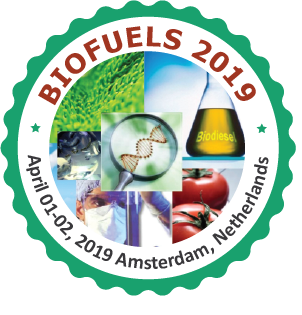
Jaccovan Haveren
Wageningen Food and Biobased research, the Netherlands
Title: Biobased jet fuels via a combined microbial –chemocatalytic approach
Biography
Biography: Jaccovan Haveren
Abstract
According to the Paris Climate Agreement (2015), global warming needs to be restricted to 2 ºC to prevent severe climate change. As a result the EU aims to reduce the emission of Greenhouse Gases (GHG) in 2050 with 80-95% relative to the 1990 benchmark. In the transport sector, the aim is to reduce GHG emissions with 60% concurrently with a reduction in fossil fuels consumption. Current projections are that the heavy duty automotive, marine and aviation transport sectors will only marginally employ renewable based electricity and hydrogen.
Therefore development of carbon containing advanced biofuels is mandatory to fulfil the needs of the heavy duty automotive, marine and aviation transport sector.
WFBR (Wageningen Food and Biobased Research) is supporting industries in developing and optimising production biomass for bioenergy purposes and of advanced biofuels. The recently ended Lignifame project studied the catalytic depolymerisation of lignin and the use of lignin-derived phenolics as a fuel additive. The ongoing Biojetfuels project comprises a combined microbial –thermo/chemo catalytic approach towards biojet fuels, starting from the side - and waste stream carbohydrates. A consortium consisting of partners along the value chain, comprising Albemarle, Fraunhofer Umsicht, Lamb Weston, SkyNRGY, Pervatech, WFBR and University of Utrecht, is studying the microbial conversion of side and waste stream carbohydrates into butanol and acetone/isopropanol and the subsequent thermocatalytic/chemo catalytic chain extension and hydrogenation into a product slate that is suitable to be used as aviation fuel. The use of lignin as a co-feed is also explored. The various steps in this sequence are being optimised and integrated in order to be able to produce a detailed techno-economic evaluation. Gas phase fermentation of CO/CO2 mixtures into butanol can complement this approach towards advanced bio-jet fuels.

